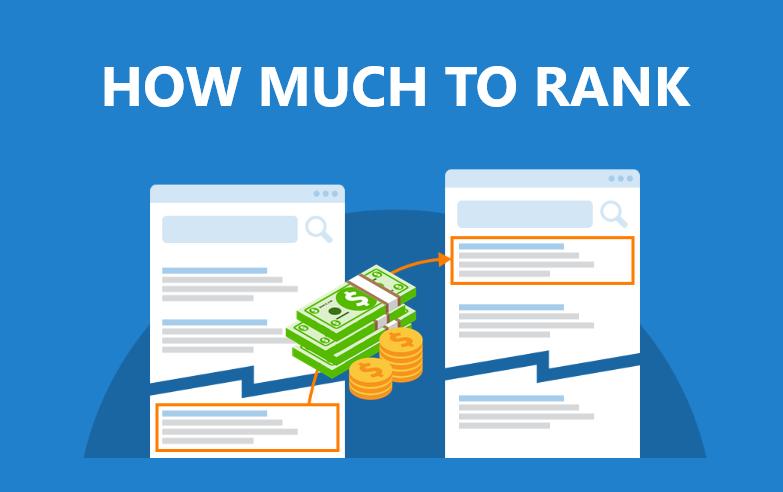
What’s the cost of SEO? Or, to be more specific: How much does it cost to get a top ranking for a given keyword? Chances are that you faced this question before.
If you ask an SEO expert, they will most likely respond with “it depends…”. Although this answer is always correct 😉 … it’s not really helpful for beginners who are just getting started with SEO. However, especially for them, a rough orientation would be particularly valuable: What is the cost that I can expect, and what are the chances of getting a top ranking?
That’s why we wanted to answer this question. The result is a free tool that we developed for you: How Much To Rank.
How Much To Rank allows you to calculate the estimated cost of a top 10 ranking for any search term. You can use it to get a quick estimate of how much you will have to invest to get on Google’s page 1, and what you actually have to do to get there. (Please note that the tool assumes that a new page is created. We do not check your already existing website.)
You want more details? Keep reading! In this post, we’ll explain how exactly the tool works and what data we use for the calculations.
Table of Contents
How does How Much To Rank work?
How Much To Rank is very simple to use: Just enter the search term you want to rank for and choose a country version of Google (e.g. Google.com or Google.co.uk). If you run a local company and aim for a top ranking in a specific city, you can choose this city to get localized results.
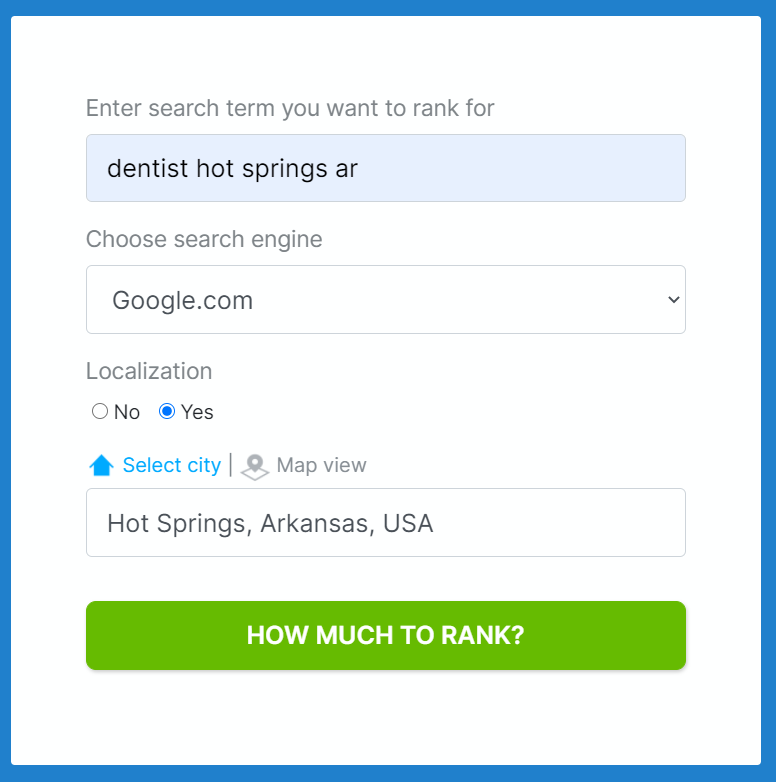
How Much To Rank then shows you the estimated cost of a top 10 ranking by displaying a simple dollar amount. In addition to that, it determines the success probability of getting into the top 10 for that keyword.
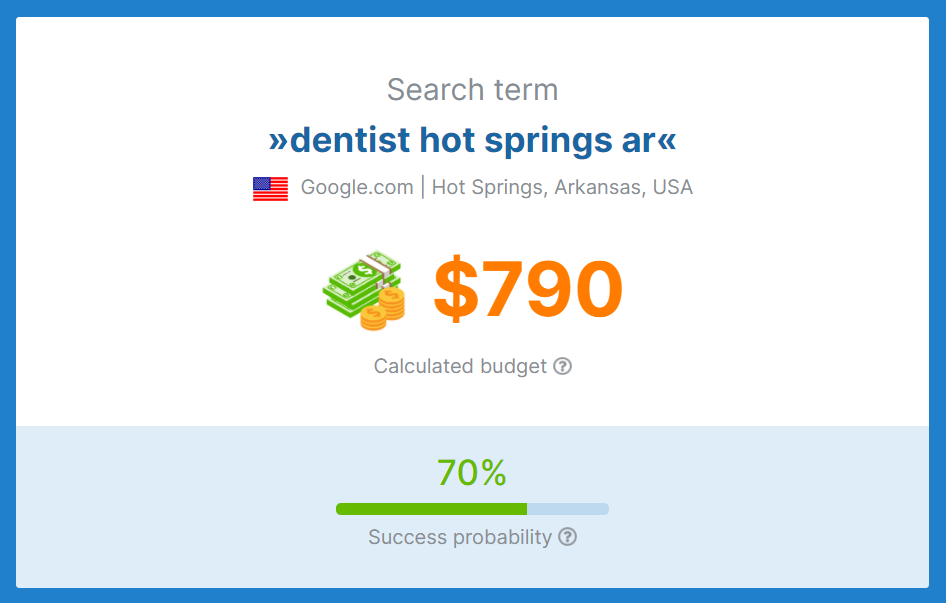
You’re wondering how we come up with these values?
How Much To Rank analyzes the top 10 websites ranking for the keyword you entered and includes various SEO metrics into the calculation, such as:
- search volume of the term
- intensity of competition
- average number of referring domains of the top 10
- content of the top 10
- Google Ads CPC
All of these metrics are used to determine the estimated cost. The success probability is calculated independently of that value and is based on search volume, CPC, and competition.
But How Much To Rank not only provides you with an estimate of the effort you will have to invest. It also generates a list of specific recommendations, so you know what to focus on during the optimization process.
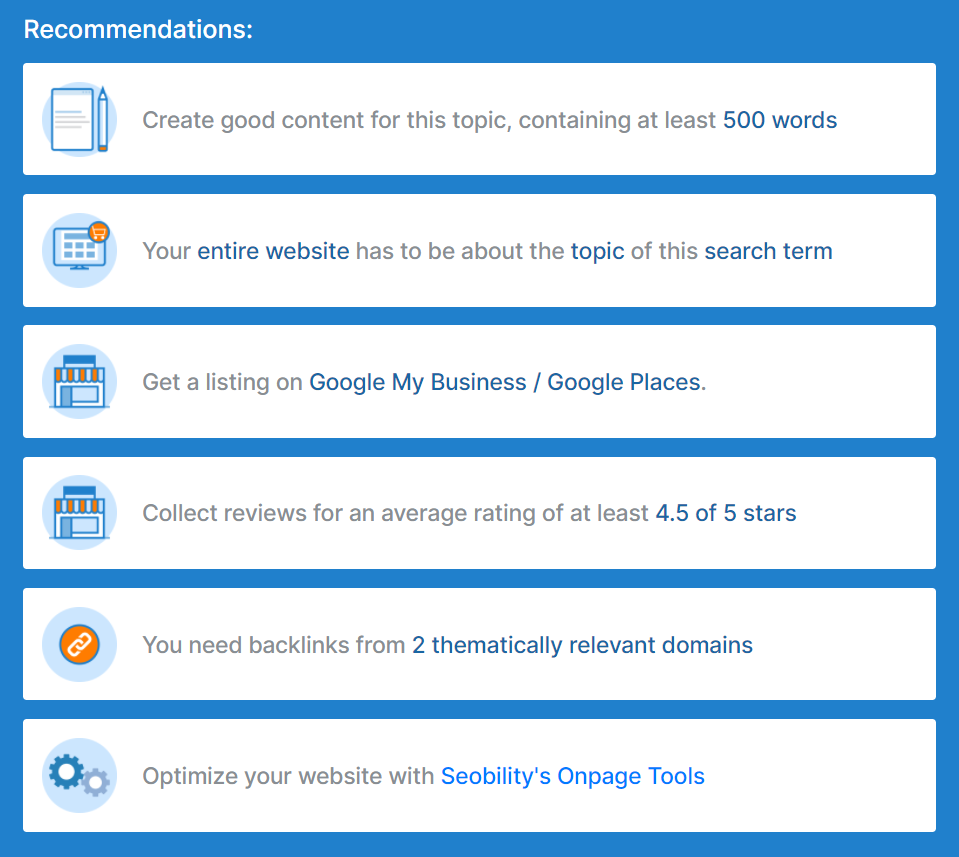
These recommendations also indicate how the cost displayed above is put together. As you can see, they include the most important SEO tasks such as on-page optimization, content creation, link building, and local SEO.
Examples
Now you know how the tool works. Next, we’re going to show you a few examples of the results and how the calculated values can be explained in each case.
In the example above, How Much To Rank displays an amount of $790. This value is quite low which can be explained by the fact that the recommendations won’t cause too much effort:
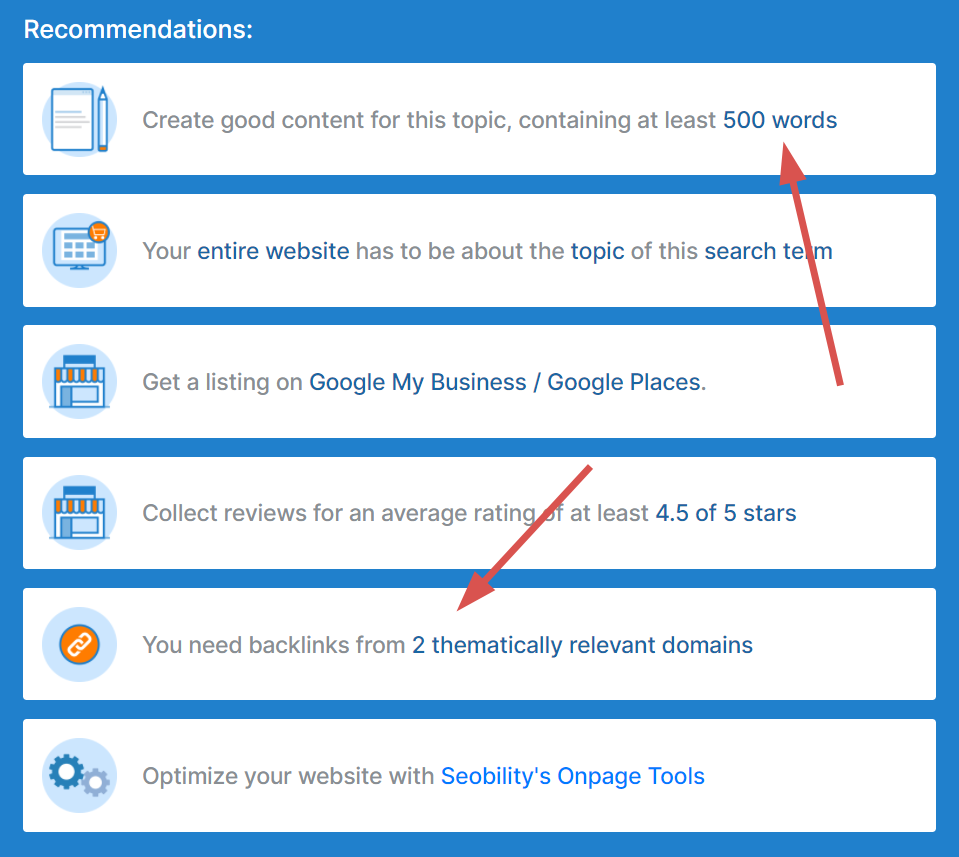
The analysis of Google’s top 10 has shown that content with at least 500 words will probably be sufficient to beat the competition. Also, the top 10 pages only have a few backlinks, so we assume that building two backlinks will be enough. Another part of the cost are reviews in order to get an average rating of at least 4.5 stars.
It’s also important to note that this is a local search query which is why the competition is low. This causes the success probability to be relatively high (70%) and the costs to be low.
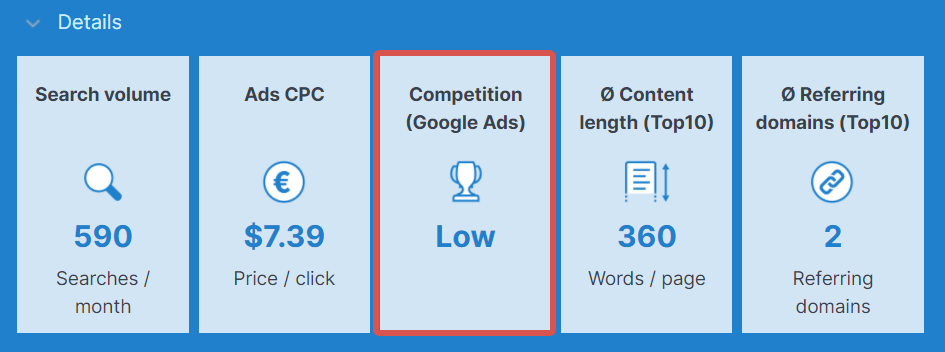
Note: The metric “competition” actually refers to paid results via Google Ads but it’s also helpful to assess a keyword’s attractiveness and competitiveness in general and for organic search in particular.
Let’s have a look at another example.
The keyword “green eating” (search engine: Google.com, no localization) gets us the following result:
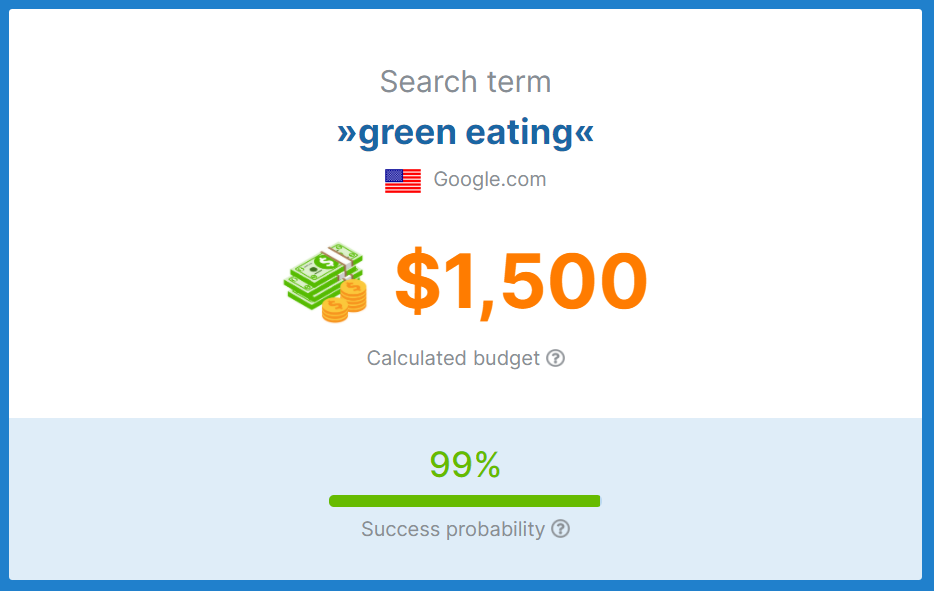
In this case, the cost is a little higher as we’re not dealing with a local search. Therefore, there’s not an easy way to get on Google’s page 1 through local results.
Nevertheless, this is still a relatively low value. The recommendations below show us why:
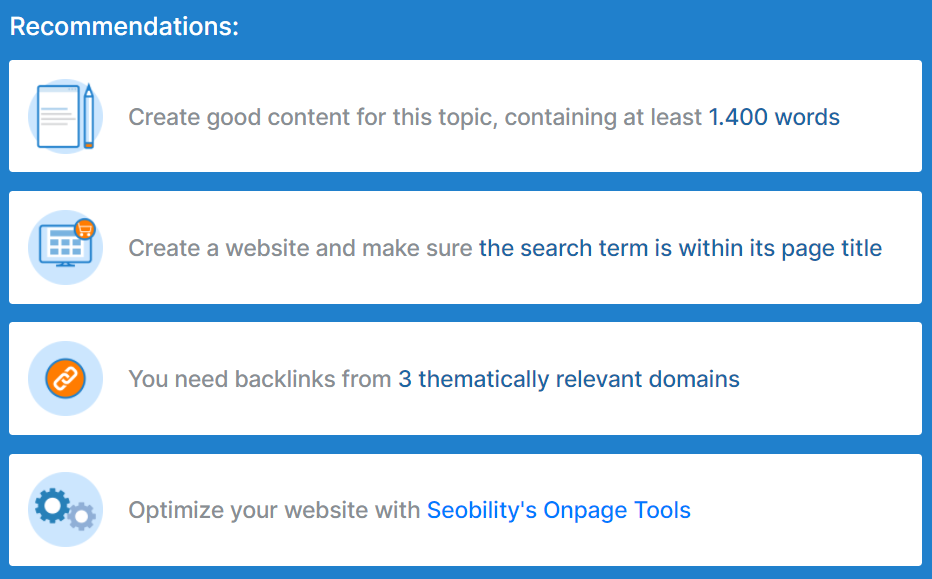
Although the recommended content length is higher than in the example before, the effort is still rather low as you only need 3 backlinks according to our analysis. Also, there are no costs for local SEO.
Finally, here is an example where the costs are significantly higher:
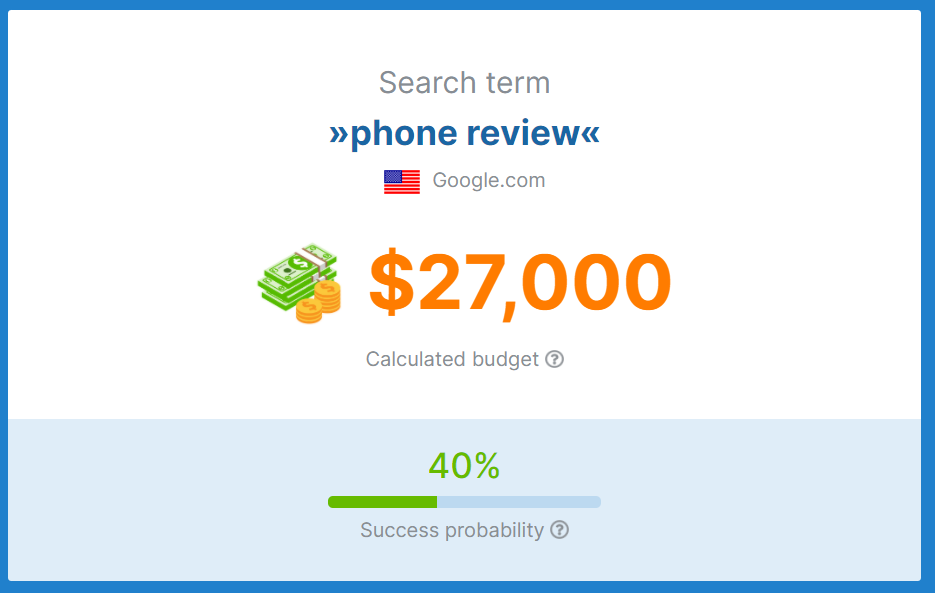
When entering the keyword “phone review” (without localization) the estimated budget is $27,000 and there’s a success probability of only 40%. This can be explained by the fact that the competition for this keyword is extremely high. Also, the top 10 on Google have an average of 106 referring domains, so a lot of link building work will be necessary which increases the cost.
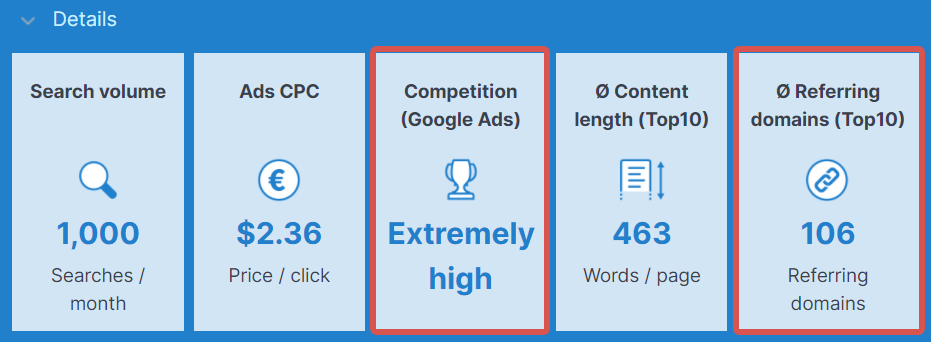
Now you should have a clearer understanding of how the tool works. But how realistic are these values actually?
How realistic are the results of How Much To Rank?
When we launched How Much To Rank on Product Hunt in March, we got a lot of positive but also critical feedback. We appreciate all the constructive feedback we received and we are already working on making How Much To Rank even better for you. So if you still have any suggestions, please let us know about them!
We know that there are still some outliers in the data and that there’s room for improvement. That’s why we would be extremely happy if you give the tool a try and let us know about your feedback in the comments! 🙂
However, please note that How Much To Rank is not able to deliver exact values that you can rely on with 100% certainty. The main purpose of the tool is to provide a first impression of the estimated SEO costs and of the effort to optimize your website for a specific keyword.
How Much To Rank thus provides an alternative to the widely used metric of keyword difficulty. As the results are presented in the form of a simple budget, they are less abstract and easier to interpret for SEO beginners.
Background information: What is the cost of SEO (in general)?
You want more details about the cost of SEO? In this section, we provide some general information about this topic.
Let’s start with the basics: In general, the cost of SEO varies greatly depending on the keyword and the type of website you run. But the basic cost components are usually the same. These include (without aiming for completeness):
Costs for an SEO audit of your website
No matter if you do SEO yourself, work with an agency, or use an SEO tool – your first task should always be a comprehensive SEO audit of your website. This enables you to assess the status quo of your website in terms of on-page optimization, backlink profile, and rankings. In our SEO Audit Guide, we explain how to conduct such an audit step by step.
Costs for on-page SEO
After you found the errors and optimization potentials of your website through an SEO audit, your next step should be on-page SEO. This includes improvements to your website’s technical foundation, structure, and content. SEO tools like Seobility can help you with this task. If you’re not a tech expert, you may need a web developer for some optimizations, which may cause additional costs.
Costs for content
If you want to rank for a certain keyword, you have to provide high-quality content on your website which is relevant to that keyword. The content creation process includes several tasks such as research and copywriting, image design, and content optimization. All of these steps take time and cause additional costs.
Link building costs
Building backlinks usually requires a lot of time and effort, depending on the link building tactics you choose. Typical tasks include researching websites that could link to you, contacting them, and writing guest posts if necessary.
Costs for local SEO
Local SEO is a very extensive topic and we’ll provide you with more information about it here on our blog soon (You better sign up for our SEO newsletter at the end of this article so you don’t miss it!). The basics of Local SEO include setting up and managing a Google My Business profile, managing reviews, building Local Citations, and more.
What influences the cost of SEO?
There are a few factors that influence the extent of the costs explained above. The most important ones include:
- intensity of competition for the target keywords
- Industry/niche: some industries are more competitive than others
- How strong are your main competitors? Do they provide high-quality content? How many backlinks do they have?
- Status quo of your website: Is it a new website or an old and trusted domain?
You should also keep in mind that SEO costs are typically highest at the beginning of the optimization process. Once you have a technically optimized and authoritative website with great content that ranks for your most important keywords, it gets easier to rank for new keywords. But even then, you should keep working on your website to avoid being overtaken by your competitors. Also, Google updates its search algorithm on a regular basis (for example, Core Web Vitals will become an official ranking factor in May), so you always have to keep up with the changes and adapt your website if necessary.
SEO costs for different types of websites
In addition to the factors mentioned above, it plays a critical role what kind of website you run when it comes to SEO costs. Therefore, we will compare the costs for three different types of websites in the next section:
- eCommerce sites
- local businesses
- blogs or content sites
Special costs of eCommerce sites
Depending on the product range, eCommerce sites often have a very high number of sub-pages. For these sites, a good structure is essential to ensure that Google can crawl and index all relevant content. In addition, many other on-page SEO tasks are particularly important for eCommerce sites, such as optimizing meta tags, product descriptions, URLs, images and page speed, as well as avoiding duplicate content. That’s why the costs for on-page SEO can be significantly higher for eCommerce sites than for other types of websites.
In addition, eCommerce sites should invest in content marketing (e.g. by running a blog) to build trust, to provide further information about their products and for link building purposes. You can find more information about this in our article about SEO Content for Online Shops.
Special costs of local businesses
Basically, local businesses have the same costs as any other website (on-page SEO, content, link building). But obviously, local SEO is especially important here. This includes additional tasks, such as managing the Google My Business profile, collecting reviews, adding structured data for opening hours, addresses, etc., or mobile optimization, which is especially important for local searches.
Special costs of blogs and content sites
If the main purpose of your website is to publish content on a regular basis, you will be faced with constant costs for content creation and optimization. Writing articles that actually provide value to your readers and that make you stand out from your competitors can take a lot of time and money. Therefore, content creation will probably make up the biggest part of your costs.
With regard to on-page SEO, it’s especially important to optimize your meta tags, headings, internal links and images. Also, link building (e.g. via guest posts) is essential in order to get your content to rank.
Conclusion
Even though there are individual differences depending on the keyword and website, the most important SEO cost components are always the same. That’s why you can use How Much To Rank regardless of the type of website you run to get a quick impression of the estimated SEO costs. If you have any questions about this topic, let us know in the comments!
PS: Get blog updates straight to your inbox!
9 thoughts on “What’s the cost of SEO? – Free Tool: How Much To Rank”
Can I use it as a Whitelabel tool on my SEO marketing website?
Hey A, thanks for your interest in our tool, but unfortunately we don’t offer a Whitelabel version of How Much To Rank at this time.
Perfect tool,
Thanks a lot. I just miss google.es ; )
Thank you, David! We’re glad that you like the tool 🙂 It’s also available for Google.es (it’s the 7th entry in the list of search engines that you can choose from).
With all professionalism, I find myself on the right path since tracking your site’s tool and reviewing all the valuable topics on your pages …. All the best for you and all your followers.
Thank you and good luck with the optimization of your website!
Great tool to help analyse what to do and how much to put on SEO. Thank you for sharing with us
Thank you, we’re happy to hear that you like it!
Hi Manas, in these two blog posts you will find lots of different link building tactics that you can use:
https://www.seobility.net/en/blog/high-quality-backlinks/
https://www.seobility.net/en/blog/link-building-tactics-how-to-build-sustainable-backlinks/
Good luck with your link building!